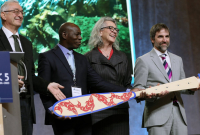This week, the population of Vancouver will temporarily grow by a small number, but the impacts of this influx of influential visitors will be massive for everyone, everywhere, for years to come.
The reason for this brief population spike is gas — namely, liquified “natural” gas (LNG), or methane you can pour. From May 7 to 9, Vancouver will host the Canada Gas Exhibition and Conference, providing around 900 LNG industry leaders access to "three days of premier networking" — in layman's terms, a catered opportunity to shmooz with Canadian policymakers. FortisBC, currently being sued for greenwashing, is a "platinum" sponsor and RBC-supported Enbridge is a "knowledge" partner.
Under four of Canada’s western provinces lies 83 trillion cubic feet of methane — the main ingredient in LNG. Some of our industry-captured policymakers desperately want to sell it.
It doesn't seem to concern them that methane is extremely harmful to the climate — in fact, 86 times more harmful than CO2. Or that fracking for it involves sucking up billions of litres of fresh water from local lakes and rivers, pumping it full of toxic chemicals, and then disposing of it untreated. Or that fracking wreaks havoc on the local environment while harming the health of communities near and far from where the extraction occurs. Today, nearly 93 per cent of gas extracted in B.C. is done through fracking.
There are already nearly 100 forest fires burning across B.C., some of which are still burning from last year. And as we are starting to feel the heat of more fires this year, the very people perpetuating the cause of this new annual devastation are here to strike deals to export our climate killer to countries suffering even more from the impacts of climate change.
This is a little like hosting a nicotine producers' conference in the respiratory ward of a hospital.
It is fairly telling that fracked gas industry leaders are arriving in Vancouver just as the cruise ship season gets underway and BC Ferries ramps up for its busy season. The shipping industry has been burning some of the dirtiest fuels available, acting as proxy waste incinerators for the refineries of the world, unwilling to make the transition to cleaner fuels. The industry has long touted LNG as “cleaner-burning” for ships while ignoring the full life cycle pollution: it has been shown to leak at every step of the process, from extraction to transportation to end use. New research has shown that these leaks are nearly twice as much as the regulators thought, meaning the pollution has recently gone from bad to worse.
The ferry and cruise ship industries have an opportunity to be leaders in Canada and for the planet, but they must not get waylaid by fossil fuel industry trade fairs, like the one happening in Vancouver right now, and chart a course towards renewable energy. Navigating this future-proof transition requires the phaseout of LNG as a marine fuel by 2030 and increased investments in zero-emission vessels and infrastructure.
Later is too late when it comes to the transition to renewables. With increasing wildfires on the horizon, the impacts of climate change clearly do not wait.
Anna (she/her) is the Canada shipping campaigner with Stand.earth. She grew up in the traditional, ancestral and unceded Coast Salish territories of the xʷməθkʷəy̓əm (Musqueam), sḵwx̱wú7mesh (Squamish), and sel̓íl̓witulh (Tsleil-Waututh) peoples known as Vancouver where she lives now with her partner and dog. Her work focuses on pollution from vessels and the environmental impacts of the shipping industry under Canada's jurisdiction.






Comments